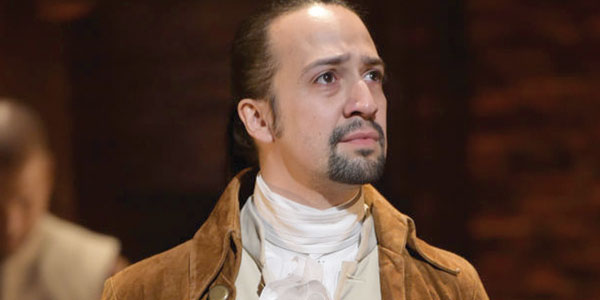
Lin-Manuel Miranda es una especie de mago. Vive en varios mundos a la vez.
Casi todas las noches lo puedes ver actuando en Broadway en la obra “Hamilton”, que él escribió. Y muchos días lo encuentras peleando por una isla, donde no nació, pero que le duele: Puerto Rico.
Puede saltar en el mismo día de su casa en Nueva York a la Casa Blanca en Washington, donde rapeó con el presidente Barack Obama. Y no tiene ningún problema en hablar conmigo en “spanglish” y brincar ágilmente de un idioma a otro. Miranda habita todos esos mundos. (Aquí puedes ver la entrevista: bit.ly/23CbFmF.)
Miranda, antes que nada, es un artista comprometido. Comprometido con su arte — se tardó siete años en escribir la obra “Hamilton”, que ha recibido un Pulitzer y un récord de 16 nominaciones a los premios Tony. Y comprometido con la isla de Puerto Rico, que tiene una deuda de 70 mil millones de dólares, y no la puede pagar.
“Mi papel en este drama político es sólo poner una cara humana, you know”, me dijo. “Yo creo que la responsabilidad de los puertorriqueños que crecieron en Estados Unidos — en la diáspora — es darle voz a los puertorriqueños que viven en la isla y que están sufriendo”.
Y eso es exactamente lo que ha estado haciendo. Miranda ha puesto la presión en el Congreso norteamericano y lo ha acusado de “inacción”. El Congreso podría hoy mismo aprobar una ley para que Puerto Rico se declarara en bancarrota, reestructurara su deuda y evitara una crisis humanitaria. Pero no han hecho nada en Washington. Nada.
Si Puerto Rico fuera el estado 51 de Estados Unidos, quizás no estaría pasando por estos problemas financieros. ¿Apoyas la estadidad? le preguntó. “Esa es una pregunta para los que viven en la isla. Vivo en Nueva York”, me dice. “That’s not my job to answer that. Y la próxima pregunta es: ¿Qué somos?”
Retomo su propia pregunta. ¿Qué son los puertorriqueños? ¿Eres puertorriqueño antes que estadounidense? “Yo me defino como un hijo de puertorriqueños que creció en Nueva York; I’m as Nuyorican as they come”, responde en dos idiomas este relator de historias musicales. “Pero yo pasé muchos veranos en Puerto Rico. Yo tengo mucha familia en la isla. Esta pregunta no es de política, es personal”. Dice Miranda que la pregunta de la identidad tiene que ser contestada por la gente que vive en la isla, “no por mí”.
El caribe está dentro de él. “Hamilton” es la historia de un inmigrante nacido en la isla caribeña de Nevis, criado en Saint Croix y que se convirtió en uno de los “padres fundadores” de Estados Unidos. Eso fue lo que atrajo a Miranda a escribir sobre Alexander Hamilton. “La historia del inmigrante es la historia de los Estados Unidos”, me contó. “Siempre hemos venido de otros países para mejorar nuestras vidas y hacer el trabajo difícil”.
¿Y cómo explicas el fenómeno de Donald Trump? “Lo que estamos viendo es algo que siempre ha pasado en nuestro proceso político, aunque no sé si tan duro como hoy”, reflexionó el también creador de la obra “In the Heights”. “Los inmigrantes siempre son el enemigo en un ciclo de elección. Pasó en 1996 con Pat Buchanan (candidato republicano a la presidencia en las primarias que atacó la inmigración mexicana), pasó con los irlandeses cuando ellos eran los inmigrantes nuevos del siglo XIX. … Y lo estamos viendo hoy”.
Para Miranda, el arte siempre va adelante de la política. Pero la tierra llama: “Yo tengo una alergia a la política. Yo prefiero estar en casa escribiendo canciones, creando arte. Pero a la vez, mi gente allá en Puerto Rico está sufriendo. Así que mientras yo tenga esta luz brillante en mí, yo la voy a enfocar al sufrimiento de la gente en Puerto Rico. Eso sí lo siento como mi responsabilidad. Yo no tengo la respuesta. Sólo tengo este spotlight”. Y en estos momentos ese reflector brilla a todo lo que da.
POSDATA MEXICANA
Me parece genial y muy valiente que Denise Dresser esté pensando en lanzarse al ruedo para las elecciones presidenciales del 2018. El tema pendiente de Ayotzinapa la está empujando, según dijo en una entrevista con Javier Risco. Jorge Castañeda también lo está pensando seria y metódicamente. Sería muy bueno para el futuro de México tener un debate con ellos dos, con Pedro Ferriz de Con — que ya se destapó — y con los candidatos de los partidos políticos tradicionales. Primera pregunta: ¿Qué van a hacer con los responsables de Ayotzinapa? Segunda: ¿Investigarán a Peña Nieto por corrupción por su Casa Blanca? Tercera: ¿Cómo evitar otros 100 mil muertos por sexenio? Cuarta: ¿Saben crear buenos trabajos? Quinta: ¿Volverán a nacionalizar el petróleo? Sexta: ¿Cuánto dinero dice que tiene? Séptima: ¿Se debe lanzar un solo candidato independiente o muchos? Octava…
(Jorge Ramos, periodista ganador del Emmy, es el principal director de noticias de Univisión Network. Ramos, nacido en México, es autor de nueve libros de grandes ventas, el más reciente de los cuales es “A Country for All: An Immigrant Manifesto”.)
The Various Worlds of Lin-Manuel Miranda
By Jorge Ramos
Lin-Manuel Miranda is like a wizard who can exist in several realms at once.
You can catch the 36-year-old Miranda playing the title role in “Hamilton,” the smash-hit Broadway musical he wrote. If Miranda’s not on stage, you might find him advocating on behalf of debt-laden Puerto Rico, or freestyle-rapping alongside President Obama in the White House Rose Garden, as he did in March.
Recently I spoke with Miranda ?(in Spanglish, with him jumping from Spanish to English seamlessly?). You can watch the interview here: bit.ly/23CbFmF.
Miranda is passionately committed to his art and to Puerto Rico, where his parents were born. He spent seven years writing “Hamilton,” based on the life of Alexander Hamilton, America’s first Treasury secretary. In April, Miranda won a Pulitzer Prize for drama, and this month, “Hamilton” collected a record 16 Tony Award nominations. Meanwhile, Miranda has used some of his newfound celebrity to raise awareness about Puerto Rico’s $70 billion debt.
“My role in this political drama is just to put a human face on it, you know?” Miranda told me. “I think that the responsibility of Puerto Ricans who grew up in the United States — in the diaspora — is to give voice to those living and suffering on the island.”
Miranda has lobbied Congress to end months of “inaction” on Puerto Rico’s debt crisis and allow the commonwealth to file for bankruptcy protection. Thus Puerto Rico could restructure its debt obligations and avoid a looming humanitarian crisis. But so far, those efforts have been in vain.
I asked Miranda if he favored statehood for Puerto Rico, and whether he believed that the island would be facing such economic woes if it were America’s 51st state. “(Statehood is) a question for those living on the island,” he said. “I live in New York.”
We also spoke about Puerto Rican identity. I asked Miranda if he identified first as an American or as a Puerto Rican. “I describe myself as a son of Puerto Ricans who grew up in New York; I’m as ‘Nuyorican’ as they come,” he said. “But I spent several summers in Puerto Rico. I have a lot of family on the island. That question is not solely political — it’s also personal. I think the identity question should be answered by the people who live on the island, not by me.”
Though Miranda was born in New York, his family’s Caribbean-immigrant roots are reflected in his art. “Hamilton” chronicles the life of the namesake Founding Father, an immigrant born on the island of Nevis and raised in Saint Croix. Hamilton’s background fascinated Miranda. “The immigrant’s story is the story of the United States,” he said. “We have always come from other countries to improve our lives and do the hard work.”
Miranda’s earlier Broadway hit, “In the Heights” was set in New York City’s Washington Heights, the primarily Hispanic neighborhood where he was born.
I asked Miranda about the current political situation — especially the Donald Trump phenomenon. “What we are witnessing now is something that has happened all the time in our political process, although I’m not sure it was as tough as it is today,” he said. “Immigrants have always been the enemy during an election cycle. That happened in 1996 with Pat Buchanan (a Republican presidential primary candidate who assailed Mexican immigration). It happened with the Irish when they were the new immigrants in the 1800s … there will always be people who use fear and capitalize on that to get votes. And we are witnessing it today.”
Given his love of history and concern for Puerto Rico, I asked Miranda if a future in politics might be a possibility. “I have an allergy to politics,” he told me. “I’d rather be at home writing songs, creating art. But at the same time, my people there, in Puerto Rico, are suffering. So, as long as I have this spotlight on me, I will focus it on the sufferings of the Puerto Rican people … I don’t have the answer; I only have this spotlight.”
For now, that spotlight is shining full-force.
A NOTE ON POLITICS IN MEXICO
I think it’s quite brave that Mexican political analyst Denise Dresser is considering running for president in 2018. The government’s handling of the case of the 43 missing college students from Ayotzinapa has made her want to declare her candidacy. Jorge Castañeda, Mexico’s former secretary of foreign affairs, is similarly pondering. And news anchor Pedro Ferriz de Con has already announced that he will run. It would be marvelous to see these three debate other candidates. The first question that should be asked: How would they deal with those responsible for the Ayotzinapa tragedy? Second: Will they investigate President Enrique Peña Nieto’s connections to a government contractor who financed a luxury home for first lady? Third: How will they stop the pace of killing that has led to 100,000 Mexican deaths during each of the two previous presidential terms? Fourth: Do they know how to create good jobs? Fifth: Would they consider nationalizing Mexico’s oil industry once again? Sixth: How much money does each candidate have in the bank? Seventh: Should just one independent candidate be allowed to run for president, or several? Eighth …










